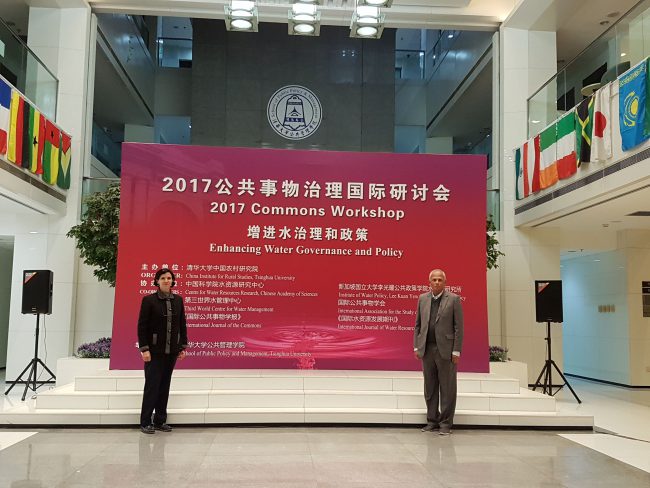
October 14, 2017
Co-directors of IWP, Associate Professor Eduardo Araral and Assistant Professor Leong Ching, Cecilia Tortajada, Senior Research Fellow and Qian Neng, Research Fellow at IWP, along with Visiting Professor, Asit Biswas, Lee Kuan Yew School of Public Policy, addressed a workshop titled The Commons Workshop on Enhancing Water Governance and Policy at Tsinghua University in Beijing.
Professor Yahua Wang at the School of Public Policy and Management and Vice President, China Institute for Rural Studies at Tsinghua University, Beijing, chaired the highly successful workshop on the commons. This first of its kind workshop took more than a year to organise, required permission from the government as well as an agreement with the university.
The focus of the 2017 Commons Workshop was “Water governance and policy.” Water is of special significance to both ancient and modern China and the country is facing new challenges resulting from water shortage, pollution, rising demand, and inter-basin transfer of water.
In his opening speech, Professor Wang noted that the study of the commons is a relatively new research field in China and can be traced back to the year 2000 when Professor Mao Shoulong from Renmin University organised the translation of Nobel Laureate Elinor Ostrom’s book into Chinese.
Since then, more works around Ostrom and the commons in China have been published by Chinese scholars; in recent years, papers around commons study in China have appeared in international journals.
Professor Wang noted he had been a visiting scholar at Indiana University working under Elinor Ostrom when she was awarded the Noble Prize, and she subsequently visited Tsinghua University in 2011.
John Powell, President of the International Association for the Study of Commons (IASC), and Frank van Laerhoven, Chief Editor of the International Journal of the Commons (IJC) both participated in the workshop.
Just over 80 senior and junior scholars from China, Singapore, the USA, the UK and the Netherlands took part in the event.
Presentations addressed issues relating to new policy developments (for example ‘River Chiefs’), water markets and pricing, water transfer, analysis of the relationship between agriculture and water consumption, and the growing urban demand for water, particularly in North China.
Several participants were former research students of Elinor Ostrom, including Prof. Shui-Yan Tang, Prof. Yahua Wang, Eduardo Araral, and Frank van Laerhoven.
Professor Ye Qui, Director of the Brookings-Tsinghua Centre for Public Policy, Tsinghua University, chaired the opening session and discussion with the following four keynote speakers.
Asit Biswas, Visiting Professor at the Lee Kuan Yew School of Public Policy, National University of Singapore, gave a presentation at the opening session of the conference noting that China had made huge advances in water management but despite this faced major water scarcity problems in the future.
Professor Biswas suggested that south to north transfers of water would ‘buy 10 – 15 years of time’ for China before significant water shortages would again rear its head. Professor Biswas suggested that the ‘much cited’ global water shortage was more a case of poor resource management than lack of water itself.
He argued that a stronger focus from academics on the synthesis of existing knowledge and improved application of knowledge, linked to the integration of new technology could solve many of the water problems in China and other parts of the world.
Professor Shui-Yan Tang, University of Southern California, drew on work undertaken from 30 years of studying irrigation and other water-related problems such as groundwater management to address the potential application of Elinor Ostrom’s principles for collective action to China’s water problems.
Professor Tang noted that although the current state of the commons research provided a good micro-analytical framework, a missing link in designing water governance regimes was the lack of attention to the macro-institutional framework. He argued strongly for greater focus on the nature and scale of problems before designing governance institutions to achieve policy objectives.
Professor Tang drew some interesting observations from a comparison of the American and Chinese governance systems, noting that neither system was perfect. He contrasted the capacity of the USA to create long enduring institutions (and long-term failure to reach agreed solutions), with China that has the capacity for rapid resolution of problems in the short-term but faces difficulties in creating long-term and enduring solutions due to the administrative approach that regularly moves officials to different locations and posts. Such movements result in a loss of experience and knowledge.
Eduardo Araral, Vice Dean of Research, Lee Kuan Yew School of Public Policy, National University of Singapore, finished the keynote speakers’ session with a critique of Elinor Ostrom’s work noting the difficulties of applying her principles to large-scale commons problems, and suggested that Dr. Ostrom’s critique of private property rights needs to be re-visited.
Several scholars stayed on for an extra two days to partake in field studies around Heng Shui, a new city to the south of Beijing in Hebei Province; the area experiences both surface and groundwater problems but is seeing the emergence of innovative solutions.
The workshop was a great success and participants and organisers look forward to seeing the commons concepts being applied to a wider range of issues in China.